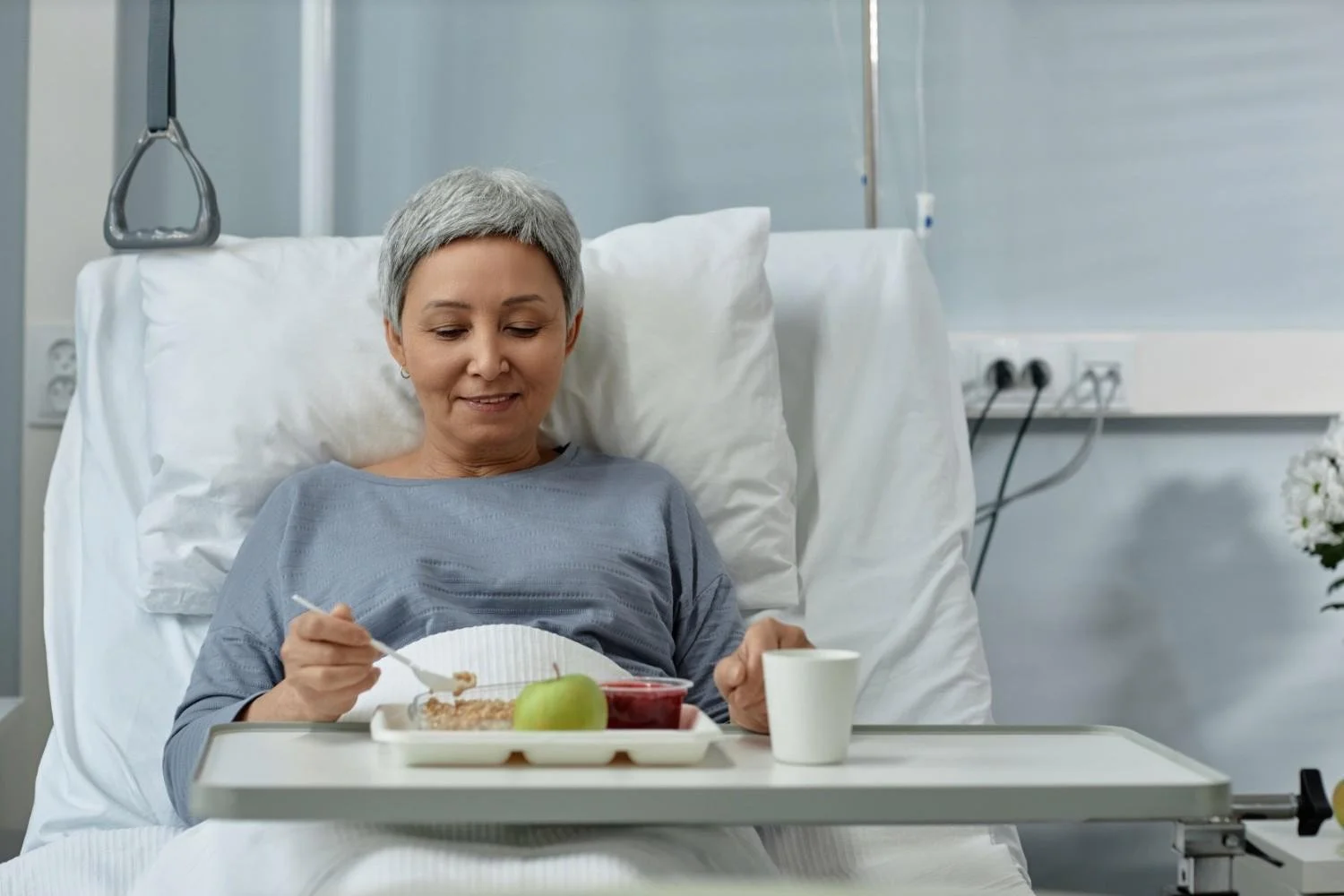No appetite? How to get nutrition during cancer treatment
Your body needs a lot of nutrition while you are getting cancer treatment, but one of the most common side effects is loss of appetite. Radiation, chemotherapy, drugs, stress, and changes in the digestive system can all make you less hungry. If you don't pay attention to these symptoms, your energy, recovery, and overall health could get worse. You can stay strong and healthy by knowing what causes problems and doing something about them.
A cancer patient resting in a hospital bed while eating a light meal, showing the importance of gentle, nutritious foods during treatment. The image highlights how small, frequent, and easy-to-digest meals help patients maintain strength when appetite is low.
Why Cancer Treatment Makes You Less Hungry
There are many things that can make you lose your appetite, such as:
• Throwing up, feeling sick, or having a metallic taste in your mouth
• Sores in the mouth or trouble swallowing
• Feeling tired or emotionally drained
• Changes in taste or smell
• Constipation and acidity are two examples of problems with digestion.
These changes can cause weakness or weight loss, which makes it hard to eat regular meals.
Signs That You're Not Getting Enough Food
• Look out for the first signs of malnutrition:
• Weight loss that isn't expected
• Feeling tired or low on energy
• Weakness or loss of muscle
• Dry skin or hair loss
• Weak immune system or feeling faint
Finding these signs early can help you avoid long-term health problems.
How to Eat When You Don't Want to
You can still stay strong by taking small steps, even if you're not hungry:
Eat small amounts often.
Instead of three big meals, eat five to six smaller ones spread out over the day.
Look for foods that are high in protein and energy.
Add milkshakes, paneer, eggs, yogurt, beans, bananas, peanut butter, and almonds.
Choose liquid food.
It's easier to eat protein shakes, soups, broths, juices, and smoothies.
Choose foods that are easy to digest.
Soft foods like yogurt, khichdi, oats, mashed potatoes, and dal-rice help keep you healthy.
Ask about supplements.
If you don't eat enough, your doctor may suggest medical nutrition supplements.
Drink a lot of water.
Drink herbal teas, coconut water, ORS, or plain water to keep your digestion and hydration in check.
You can help your body get the nutrients it needs without having to eat big meals by following these simple steps.
Treatment for Severe Loss of Appetite
If you lose your appetite a lot, your doctor may suggest:
Medications that stop vomiting
Drugs that make you want to eat more
Nutrition supplements
IV fluids if you are dehydrated
Custom meal plans
A dietician or oncology nutritionist can give you advice based on your health and treatment plan.
When to See a Cancer Specialist
If you see any of the following, get in touch with your oncologist right away:
Not being able to eat for more than 24 hours
Fast loss of weight
very bad dehydration or throwing up
Very weak or dizzy
Having trouble swallowing
Not getting care right away could make recovery take longer and make the immune system weake
Why Cancer Treatment Makes You Less Hungry
There are many things that can make you lose your appetite, such as:
Throwing up, feeling sick, or having a metallic taste in your mouth
Sores in the mouth or trouble swallowing
Feeling tired or emotionally drained
Changes in taste or smell
Constipation and acidity are two examples of problems with digestion.
These changes can cause weakness or weight loss, which makes it hard to eat regular meals.
Signs That You're Not Getting Enough Food
Look out for the first signs of malnutrition:
Weight loss that isn't expected
Feeling tired or low on energy
Weakness or loss of muscle
Dry skin or hair loss
Weak immune system or feeling faint
Finding these signs early can help you avoid long-term health problems
How to Eat When You Don't Want to
You can still stay strong by taking small steps, even if you're not hungry:
Eat small amounts often.
Instead of three big meals, eat five to six smaller ones spread out over the day.
Look for foods that are high in protein and energy.
Add milkshakes, paneer, eggs, yogurt, beans, bananas, peanut butter, and almonds.
Choose liquid food.
It's easier to eat protein shakes, soups, broths, juices, and smoothies.
Choose foods that are easy to digest.
Soft foods like yogurt, khichdi, oats, mashed potatoes, and dal-rice help keep you healthy.
Ask about supplements.
If you don't eat enough, your doctor may suggest medical nutrition supplements.
Drink a lot of water.
Drink herbal teas, coconut water, ORS, or plain water to keep your digestion and hydration in check.
You can help your body get the nutrients it needs without having to eat big meals by following these simple steps.
Treatment for Severe Loss of Appetite
If you lose your appetite a lot, your doctor may suggest:
Medications that stop vomiting
Drugs that make you want to eat more
Nutrition supplements
IV fluids if you are dehydrated
Custom meal plans
JIET Hospital Jodhpur – Your Partner in Cancer Nutrition & Recovery
The skilled oncology and mental health staff at JIET Hospital providing one of the best treatment in india ,at JIET Hospital Jodhpur. The hospital offers advanced cancer care, nutrition assessments, customized diet plans, and ongoing support to help patients maintain strength and recover faster. Known as one of the most trusted hospitals in Jodhpur, JIET Hospital brings together medical expertise, modern facilities, and compassionate guidance to ensure better health, improved nutrition, and stronger outcomes during cancer treatment.




